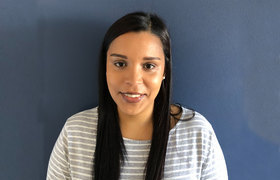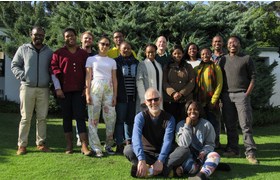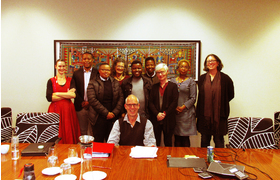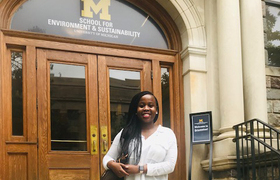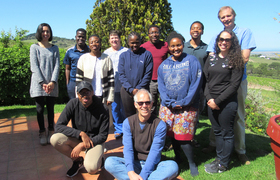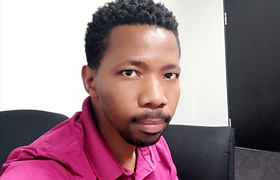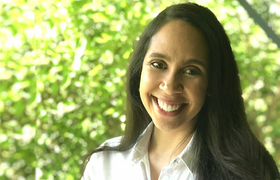Teboho Mofokeng: new nGAP lecturer in civil engineering
03 May 2021 | Story Robert Morrell. Photo Supplied. Read time 5 min.
Teboho Mofokeng has joined the Faculty of Engineering & the Built Environment as a lecturer in the Department of Civil Engineering. Her passion is water engineering, which is understandable when one considers that South Africa is a water-scarce country.
Mofokeng grew up in Bethlehem, Free State. She is one of three daughters and endured the agonies of being the middle child – too young or too old to do just about anything! At the age of 11, her parents sent her to boarding school at St Michael’s School for Girls in Bloemfontein.
“Looking back, going to boarding school at such a young age helped me to be independent and responsible early on,” she reflected.
She represented the Free State in hockey from u/13 until u/19, and in most cases she was either captain or vice-captain of the teams she played for. She matriculated as head girl.
The passing away of her mother when she was 16 left her widowed father to educate three children on a teacher’s salary.
“I was half-heartedly considering a career in accounting when my friend’s dad offered me a bursary from Ninham Shand (now Zutari) to study civil engineering,” she said.
She felt fortunate to qualify for the bursary and help ease the financial burden on her father. Although she had no clue what civil engineering was about, she took the opportunity with both hands and never looked back.
“This choice was a strategic career move, as it meant that I would get to work at the Cape Town office with the waste-water specialist team.”
Mofokeng was inspired by Professor George Ekama, a highly rated water engineer, fellow of the University of Cape Town and the UNESCO-IHE Institute for Water Education (Delft) and Distinguished Fellow of the International Water Association. Ekama had a passion for waste water, so Mofokeng decided to complete her MSc in civil engineering in this area before joining the private sector.
“This choice was a strategic career move, as it meant that I would get to work at the Cape Town office with the waste-water specialist team,” she said.
At the start of her working career in 2008, there were few females in the industry, let alone of colour and in management. Within four years of working, she had two children (aged four and two), was registered as a professional engineer and was soon after promoted to associate director. After being an associate for only 12 months, she was promoted to technical director.
With 12 years of working in the private sector behind her, she began to reconsider where the real power to make a difference in the water sector was. She quit her job in 2019 to start a training and development company and authored a book on career development and leadership titled Finding Your Seat at the Table. The book gives a perspective on the future of work and how to create the ideal career yourself.
Finding nGAP
While pondering how and where to pursue a PhD, she came across the nGAP advert on LinkedIn.
“It is very rare that you read an advert that feels like it was written specifically for you!” she said with a smile.
“You know you are at the right place when the language and culture of the people around you ignites something in you.”
She is currently in the process of writing her PhD proposal for the topic: “The influence of seawater intrusion on the performance of wastewater treatment works during drought conditions”.
“You know you are at the right place when the language and culture of the people around you ignites something in you, and this is only the beginning!” she said.
She is excited to contribute to making a positive impact through innovating research and developing civil engineers that are ready to solve 21st-century problems. She has found the journey of transitioning to the academic life pleasant thanks to being part of the nGAP programme.
 This work is licensed under a Creative Commons Attribution-NoDerivatives 4.0 International License.
This work is licensed under a Creative Commons Attribution-NoDerivatives 4.0 International License.
Please view the republishing articles page for more information.
New Generation of Academics Programme (nGAP)
UCT has responded energetically to the New Generation of Academics Programme (nGAP), an opportunity provided by the Department of Higher Education (DHET) to build a new generation of black South African academics. The DHET’s 2015 vision document, “Staffing South Africa’s Universities Framework: A comprehensive, transformative approach to developing future generations of academics and building staff capacity”, proposes a suite of initiatives to address the challenge, with nGAP being the major instrument to increase the numbers of black South African academics.
The programme “involves the recruitment of highly capable scholars as new academics, against carefully designed and balanced equity considerations and in light of the disciplinary areas of greatest need”. The nGAP scholars are appointed into permanent positions where from the outset their conditions are customised to ensure their successful induction into the ranks of established academics.
The DHET provides funding over a six-year period to support the appointment of an nGAP lecturer, and their time is protected to provide the best possible opportunity for the completion of a doctorate degree in the shortest possible time. Once the degree is completed, the nGAP lecturer’s teaching commitments are steadily increased until they shoulder a full teaching load.
Since the first advertisement for nGAP posts in 2015, UCT has been awarded 17 nGAP positions: 5 (Phase 1), 4 (Phase 2), 3 (Phase 3) and 5 (Phase 4). These are distributed across all faculties.
UCT’s nGAP scholars operate as a single cohort, managed and coordinated by Dr Robert Morrell. Lecturers meet for quarterly meetings, writing retreats and various capacity-building activities all designed to support the completion of postgraduate qualifications (particularly doctorates) and to develop records of achievement that will testify to their emergence as self-standing, excellent academics. Each lecturer is mentored by a senior scholar, who provides support and guidance on the challenges that routinely face academics.
The nGAP manager sets great store in building the cohesion of the cohort and encouraging the establishment of new UCT networks while producing a collaborative, mutually supportive and embracing work culture.
According to Dr Morrell, “This group of academics will lead UCT in 15 to 20 years’ time ... Their vision of excellence, of being African and South African, of serving a wider community and producing knowledge for the planet, the continent and the country, will power UCT in years to come.”
Newsletters
In the news
